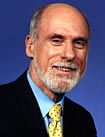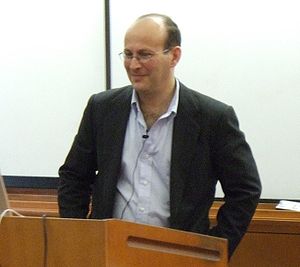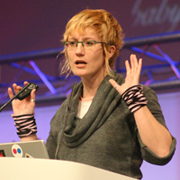 Keynote Speakers
Keynote Speakers
Wednesday, 9:00–10:30 AM
Vint Cerf: Bandwidth, Clouds and Things, Oh My!

Vint Cerf
[presentation slides; video clips] What happens when bandwidth isn’t a bottleneck? What happens when end to end speeds approach or exceed a gigabit per second? What happens when billions of devices populate the Internet, including appliances? What happens when the smart grid meets the Internet of Things and clouds interconnect in a rainbow of photons? How does this transform the World Wide Web? These and other ideas will occupy our attention as we explore a speculative future.
Vint Cerf is vice president and Chief Internet Evangelist for Google. He is responsible for identifying new enabling technologies and applications on the Internet and other platforms for the company.
Widely known as a “Father of the Internet,” Vint is the co-designer with Robert Kahn of TCP/IP protocols and basic architecture of the Internet. In 1997, President Clinton recognized their work with the U.S. National Medal of Technology. In 2005, Vint and Bob received the highest civilian honor bestowed in the U.S., the Presidential Medal of Freedom. It recognizes the fact that their work on the software code used to transmit data across the Internet has put them “at the forefront of a digital revolution that has transformed global commerce, communication, and entertainment.”
From 1994-2005, Vint served as Senior Vice President at MCI. Prior to that, he was Vice President of the Corporation for National Research Initiatives (CNRI), and from 1982-86 he served as Vice President of MCI. During his tenure with the U.S. Department of Defense’s Advanced Research Projects Agency (DARPA) from 1976-1982, Vint played a key role leading the development of Internet and Internet-related data packet and security technologies.
Since 2000, Vint has served as chairman of the board of the Internet Corporation for Assigned Names and Numbers (ICANN) and he has been a Visiting Scientist at the Jet Propulsion Laboratory since 1998. He served as founding president of the Internet Society (ISOC) from 1992-1995 and was on the ISOC board until 2000. Vint is a Fellow of the IEEE, ACM, AAAS, the American Academy of Arts and Sciences, the International Engineering Consortium, the Computer History Museum and the National Academy of Engineering.
Vint has received numerous awards and commendations in connection with his work on the Internet, including the Marconi Fellowship, Charles Stark Draper award of the National Academy of Engineering, the Prince of Asturias award for science and technology, the Alexander Graham Bell Award presented by the Alexander Graham Bell Association for the Deaf, the A.M. Turing Award from the Association for Computer Machinery, the Silver Medal of the International Telecommunications Union, and the IEEE Alexander Graham Bell Medal, among many others.
He holds a Ph.D. in Computer Science from UCLA and more than a dozen honorary degrees.
Thursday, 9:00–10:00 AM
danah boyd: Publicity and Privacy in Web 2.0
[text, video clips] With brilliant repetition, an argument is espoused every few years that privacy is now finally dead because of some new web practice. Recently, Facebook’s Mark Zuckerberg justified his company’s decision to switch defaults to “everyone” with the logic that the youngest generation no longer cares about privacy. Similarly, Google’s Eric Schmidt claimed, “If you have something that you don’t want anyone to know, maybe you shouldn’t be doing it in the first place.” These arguments are espoused by the most privileged technologists like clockwork.
Amidst this public discourse, individuals are battling out what it means to navigate an ever-shifting public landscape, carving out privacy in ways that are meaningful to them. In doing so, they highlight the complex and intertwined ways in which privacy and publicity operate.
In this talk, I will use various Web 2.0 and social media sites as foils for thinking about how privacy is baked into technology before turning to the practices of people as they seek to make sense of these spaces. I will lay out how we’ve moved from a “private by default, public through effort” culture to one that is now “public by default, private through effort.” I will consider the differences between PII (personally identifiable information) and PEI (personally embarrassing information) to discuss how privacy debates are necessarily shifting. Finally, I will look at the practices of celebrities and micro-celebrities, groups that are seeking publicity in new ways through mediated technologies. Woven into this analysis will be a discussion of youth practices, as their norms and expectations are shaping how privacy and publicity are playing out.
Privacy is not dead, but it is deeply misunderstood. The goal of my talk will be to provide a framework for understanding how privacy and publicity are changing and the implications that this has for designers, developers, scholars, and participants.
danah boyd is with Microsoft Research New England and a research fellow at the Berkman Center for Internet and Society at Harvard University.
Dr. boyd’s research “Taken Out of Context: American Teen Sociality in Networked Publics” focuses on how American youth use networked publics for sociable purposes. She examines the role that social network sites like MySpace and Facebook play in everyday teen interactions and social relations. Her interests reside in how mediated environments alter the structural conditions in which teens operate, forcing them to manage complex dynamics like interacting before invisible audiences, managing context collisions, and negotiating the convergence of public and private life. The MacArthur Foundation funded the research as part of a broader grant on digital youth and informal learning.
At the Berkman Center, danah co-directs the Internet Safety Technical Task Force to work with companies and non-profits to identify potential technical solutions for keeping children safe online. This Task Force was formed by the U.S. Attorneys General and MySpace and is organized by the Center.
Dr. boyd received a bachelor’s degree in computer science from Brown University, a master’s degree in sociable media from MIT Media Lab, and doctoral degree from the University of California-Berkeley. She has worked as an ethnographer and social media researcher for various corporations, including Intel, Tribe.net, Google, and Yahoo! She also created and managed a large online community for V-Day, a non-profit organization working to end violence against women and girls worldwide. She has advised numerous other companies, sits on corporate, education, and non-profit advisory boards, and regularly speaks at industry conferences and events. She maintains a blog on social media called Apophenia.
Friday, 9:00–10:00 AM
Carl Malamud: A Tale of Seven Bureaucracies

Carl Malamud
[video clips] In this WWW2010 Keynote, Carl Malamud will relate the story of his encounters with 7 bureaucratic institutions in his quest to convince government that if law is code, then it must be open source. Starting with the International Telecommunication Union (ITU) in the days before the Web and moving on to today’s Law.Gov movement, Carl will present his case that materials, be they technical standards or court opinions, must be available to all.
Carl Malamud is founder and director of Public.Resource.Org a nonprofit corporation that has placed over 90 million pages of U.S. government documents on the Internet, including a large number of judicial opinions, public safety codes, and other materials that were never publicly available before. Public.Resource.Org has also been responsible for removing information that contains Social Security numbers and other protected private information from the Internet, and running a series of audits that have resulted changes in both the U.S. Congress and the federal judiciary. Public.Resource.Org also runs FedFlix, a program that digitizes government videotapes and then puts them on-line as a public domain stock footage library.
Previous to running Public.Resource.Org, Carl was the Chief Technology Officer at the Center for American Progress, and the founder of the Internet Multicasting Service, which ran the first radio station on the Internet, put the U.S. SEC and Patent databases on-line, and created the Internet 1996 World Exposition. He is the author of 8 professional reference books and has done stints as a visiting professor at the MIT Media Lab and Keio University. He received the Berkman Award from Harvard University and the EFF Pioneer Award.





